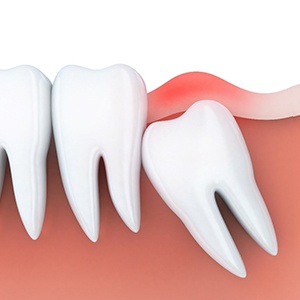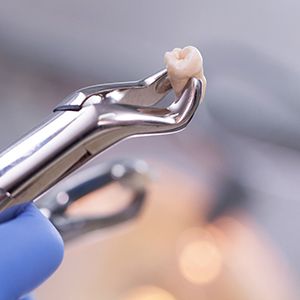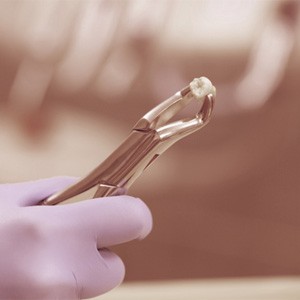Wisdom Tooth Extractions
Avoid Future Complications In Your Smile
The final set of permanent molars in your smile is known as your “wisdom teeth” since they will usually emerge when you’re around 17 and 25 years old. In many cases, people decide to remove these pearly whites, as they can cause complications in the rest of your smile if left alone. Not only can they place pressure on your nearby healthy teeth, resulting in discomfort and orthodontic issues, but they can increase the risk of future damage and infection. By undergoing wisdom tooth extractions, our team can protect your smile from an impacted molar. Keep reading or give us a call to schedule your initial consultation.
Why Choose East Islip Dental Care for Wisdom Tooth Extractions?
- Performs Entire Extraction Process In-Office
- Offers Sedation Dentistry for Optimal Comfort
- In-Network with Multiple Dental Insurance Providers
What Are Wisdom Teeth?

Wisdom teeth are the third and final molars that humans can develop. These kinds of teeth are the wide and flat ones located in the back of your mouth, which are specifically designed to grind up your food for easier digestion. That said, since our processed foods are typically softer and require less chewing and grinding, most people don’t need their wisdom teeth. In fact, many don’t even have sufficient space in their jawbones to accommodate these final molars. Today, some people are born without a third molar.
Why Do Wisdom Teeth Need to Be Removed?

Those who do develop several or all of their wisdom teeth may end up requiring extractions later on. Since there isn’t always enough space in the jaw, these molars can end up trapped beneath the gum line, resulting in an impacted tooth. On top of causing moderate discomfort, this situation can make your smile vulnerable to bacteria that can turn into an infection. A wisdom tooth that’s coming in at an angle can place too much pressure on your other teeth, resulting in potential damage and orthodontic problems.
What to Expect from the Wisdom Teeth Procedure

There are a couple of different methods for removing wisdom teeth, which will be based on how your molars have developed. The good news is that our practice can perform the entire procedure in-office, meaning you won’t have to be referred to a local specialist and can receive your treatment from a team you already know and trust. We’ll first discuss the details of your treatment plan and how you should prepare for your procedure. On the day of your wisdom tooth extractions, we’ll completely numb your mouth and provide you with dental sedation to keep you as comfortable and relaxed as possible. We’ll then use specialized tools to remove it effectively and safely before suturing your gums closed.
Recovering from Wisdom Teeth Extraction

Once your procedure is completed, a trusted friend or family member will drive you home. You should plan on resting for the remainder of your day, as this will help speed up your recovery. Our team will have provided you with specific aftercare instructions before and after your appointment, which should involve taking prescribed or over-the-counter pain relievers, using a cold compress, rinsing your mouth carefully with lukewarm water (or salt water), and eating soft foods (like soup, pudding, and applesauce). If you notice any symptoms like slight/persistent bleeding, swelling, and pain, be sure to notify our team right away for help.
Understanding the Cost of Wisdom Tooth Extractions

Over 90% of Americans have their wisdom teeth removed due to the risk that their third molars pose to their oral health, but despite this procedure being so common, the cost can vary from patient-to-patient, depending on your unique situation. At East Islip Dental Care, our team takes pride in offering trustworthy and transparent dentistry, from providing you with detailed cost estimates and filing your insurance claims to making the procedure as comfortable as possible.
Factors That Can Impact the Cost of Wisdom Tooth Extractions

There are several different details that can impact the cost of wisdom tooth extractions, including:
- How Many Wisdom Teeth You Have: Not everyone is born with all four of their wisdom teeth, some people may have one, two, or three. If you only have one, the cost of your treatment will be significantly less expensive due to a shortened procedure.
- Whether Your Wisdom Teeth are Impacted: Impacted wisdom teeth require surgical intervention, which means in order for them to be removed, your gums will need to be opened. This can complicate the procedure and may require you to be under a stronger method of sedation.
- If You Require Dental Sedation: Dental sedation typically incurs an additional fee, but helps you have a more comfortable experience.
- Whether You Need to See a Specialist: Our team at East Islip Dental Care is able to complete both regular and surgical wisdom tooth extractions, allowing us to minimize our patients’ cost by eliminating the need to have to visit a specialist. However, in certain, more complex cases, we may refer you to ensure you receive the best results.
Does Dental Insurance Cover Wisdom Tooth Extractions?

While every dental insurance plan is different, most will cover at least a portion of the cost of wisdom tooth extractions. The exact percentage will depend on your specific plan, but our team is happy to help you learn more about your coverage. We’re also proud to be in-network with most major dental insurance plans, and even if you aren’t in-network with our practice, we’re happy to file claims on your behalf so you can maximize your coverage.
Making Wisdom Tooth Extractions More Affordable

In addition to being an in-network practice with most major dental insurance plans, we also offer additional financing through Wells Fargo that can accommodate a variety of budgets to make paying for treatment easier. For those who are uninsured, we have an in-house dental plan that covers all of your basic preventive needs as well as a 20% discount on most other treatments we offer.
Wisdom Tooth Extractions FAQs

Has the time come to get your wisdom teeth taken out? You may have some unanswered questions about the procedure, so we’re here to help! Here are the answers to some of the most common questions we receive about wisdom tooth extractions. If you don’t see the information that you’re looking for below, give us a call ! We’d be more than happy to address your questions and/or concerns.
Why Are Wisdom Teeth Called That?
These days, wisdom teeth tend to grow at strange angles and cause problems. How is this “wise” at all? The theory is that since these teeth don’t emerge until early adulthood, a person is older than they were when the rest of their teeth erupted. It is believed that with age comes wisdom, therefore these molars got the name “wisdom teeth.”
Is Wisdom Tooth Removal Painful?
The first step of your procedure is numbing the area with a local anesthetic. You will also most likely be sedated, limiting your body’s ability to register pain. Your procedure should be completely painless. You will likely experience some discomfort for several days afterward, but this can be managed with over-the-counter and prescribed pain medications. By closely following your aftercare instructions, you should be feeling back to normal within a week!
How Long Does Wisdom Tooth Surgery Take?
If you are being sedated, it will feel like barely any time has passed. On average, it takes about 15 to 20 minutes to extract a wisdom tooth. Removing all of them can take up to 90 minutes. This time will vary depending on the location of your teeth, their positions, and whether or not they are impacted. Before your procedure, your dentist can give you a more specific estimate of how long your procedure will take so you can plan accordingly.
Are Wisdom Tooth Extractions Covered by Insurance?
Most of the time, wisdom tooth extractions are deemed medically necessary, so your insurance plan will likely cover a portion of the cost. This is usually around 50% until you have reached your annual maximum. Keep in mind that the exact percentage that they cover will depend on your individual plan, so you should check with your provider ahead of time. If you have any questions regarding your dental insurance plan, one of our friendly team members would be happy to assist you.

